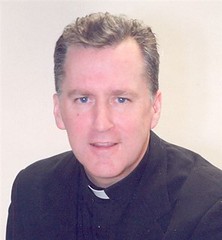The title mother of God does not mean that Mary, who was created by God, existed before God, but that Jesus who existed first, who shares the same Divine Nature as the Father and the Holy Spirit; Jesus who is the Eternal Word of the Father assumed our human nature in the womb of the Blessed Virgin Mary. The person who Mary conceived and gave birth to at Bethlehem is God himself. Therefore when we honor Mary with the title Mother of God, we are really honoring Jesus.
Bishops throughout the Christian world gathered in Ephesus in modern day Turkey in 431 to defend Mary’s title as Theotokos or God-bearer which at this time had already become a time honored phrase.
Nestorius, the Patriarch of Constantinople challenged the title. Nestorius was a gifted, clever but weak theologian. He claimed that Mary gave birth to human nature only. He said Mary was the mother of the man Jesus whom God dwelt in as a temple.
St. Cyril of Alexandria defended the divinity of Christ and Mary’s title of God-bearer. St. Cyril said that you can’t give birth to a nature without giving birth to a person. St. Cyril pointed out Nestorius error to Pope Celestine I who convoked the Council of Ephesus to settle the question officially.
As the Council was making its deliberations the people waited outside. When they heard the news that The Council fathers had reaffirmed the teaching of Mary as God-bearer, they cheered the Council Fathers and there was a great celebration. The people led torchlight processions through the streets with the bishops and other delegates.
But Nestorius refused to back down. He held a council at Antioch without the approval of the Pope. The Antiochenes attempted to excommunicate St. Cyril of Alexandria. Instead, delegates from Rome arrived and excommunicated Antiochenes. Sixtus III (432-440) succeeded as Pope. He renovated the Basilica of Santa Maggiore with an icon of Mary, Mother of God.
St. Cyril’s defense of Mary’s title as Mother of God reminds us that Mary always leads us to her Divine Son. To honor Mary is to honor Christ. Mary is the new Ark of the Covenant. The Ark of the Covenant carried holy bread and tablets of the law, but Mary is far greater because she carried God himself. For while the law was given through Moses, grace and truth came through Jesus Christ. (John 1, 17) Jesus, our God, took on flesh in the womb of the Blessed Virgin Mary. When we call her Blessed we fulfill her prophecy she made in the Bible in her Magnificat when she said “…from now on will all ages call me blessed”. (Luke 1,48)
Jesus gave us his Mother to be our Mother from the Cross when he said to St. John the Apostle “Behold your mother” and when he said to Mary about St. John “Woman, Behold your son.” St. John says from that hour he “took her into his home.” (John 19, 26-27) We are also called to take Mary into our home to be our mother that she may lead us into a more intimate relationship with her Son, Jesus Christ.
Mary teaches us to pray. She treasured things in her heart. How often do we turn our hearts and reflect on the things God has done for us? We honor Jesus and Mary when we pray the rosary. Praying the rosary is a beautiful way to imitate Mary who reflected on the things that God was doing in her life in her heart. The soul of the rosary is reflecting on the mysteries in the life of Jesus and Mary. The other prayers – the Our Father, Hail Mary and Glory Be form a background for our meditation on the mysteries
We face so many difficulties in this life whether it be sickness or family members who have fallen away from the faith or problems in the world. What can we do? The answer is to start by praying the rosary.
Sister Lucia, who died in 2005, was the last surviving visionary from Fatima. She once told a priest that in the times in which we live the Blessed Mother has given a new efficacy to the recitation of the rosary. She said that Mary “has given this efficacy to such an extent that there is no problem, no matter how difficult it is, whether temporal or above all, spiritual, in the personal life of each one of us, of our families, of the families of the world, or of the religious communities, or even of the life of peoples and nations that cannot be solved by the Rosary."
We should always approach Mary the Mother of God, and our mother too, with confidence and devotion. May we always give her the love and honor she deserves. We ask her to help us faithfully imitate her Son. Let us never fail to call on her in all our needs, especially pray for peace and a greater respect for all human life, from the moment of conception to the moment of natural death.






